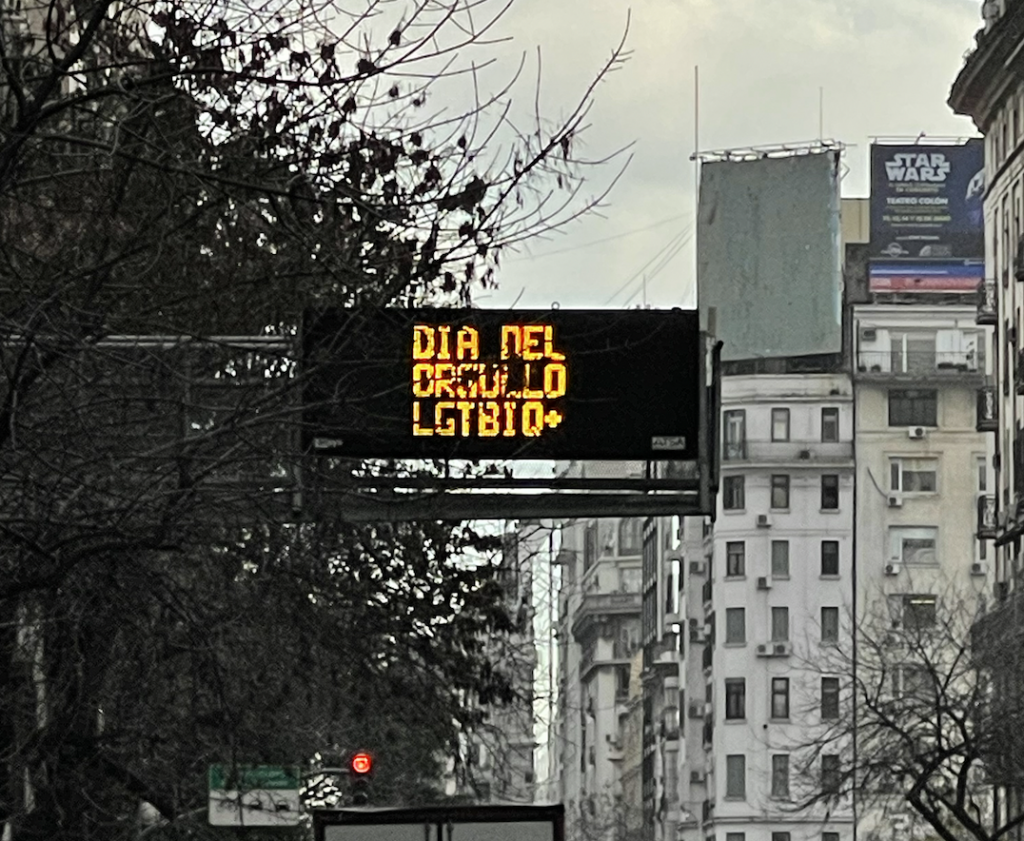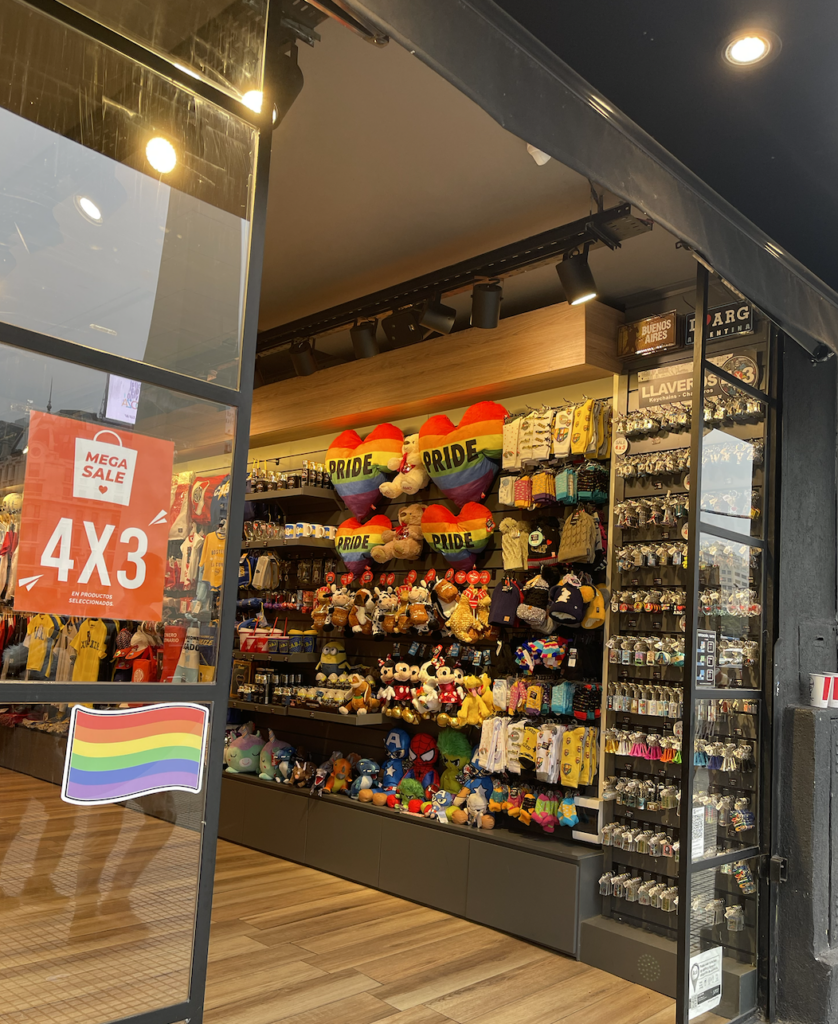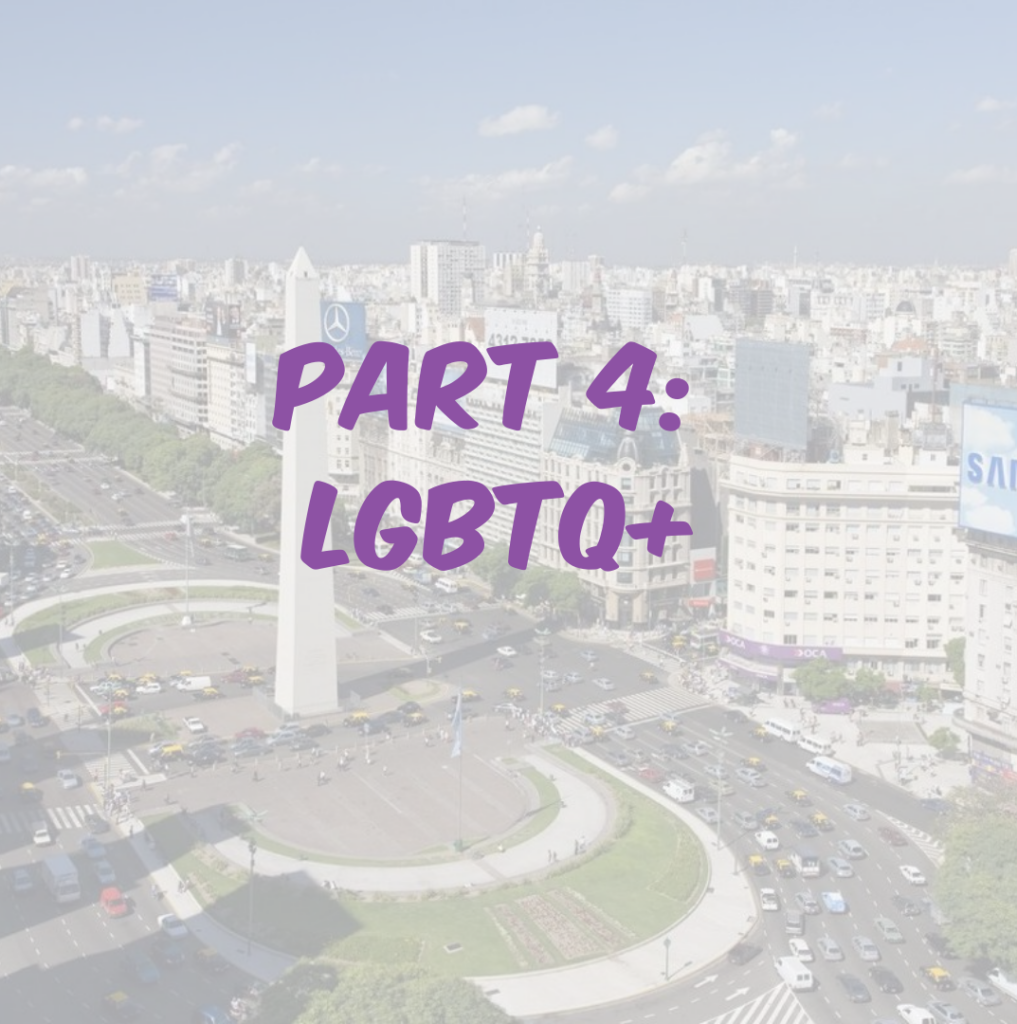Everywhere I look, rainbow pillows, teddy bears, and stickers blanket the city. There are Pride flags visibly stamped onto storefronts. A few queer businesses have painted the sidewalk in front of their front doors with a rainbow. Instead of a “red carpet,” it’s a “rainbow carpet.” Not only is LGBTQ+-friendly merchandise easy to find, but Pride celebrations are widely advertised throughout the city. They even put “Día del Orgullo LGBTIQ+” or “LGBTIQ+ Pride Day” on a highway information board.
But as we know, rainbow-washing may not be an indication that our fellow queers have actually gained equal rights.

From my perspective, Buenos Aires seems like an LGBTQ+-friendly city. In fact, surveys show that 75% of people in Argentina accept LGBTQ+ communities (much more than in any other place in South America).
But how are folks in the LGBTQ+ community treated in terms of their rights and inclusion? Let’s take a look at Buenos Aires and Argentina when it comes to truly making a change in the queer community.
Inclusive Policy Change to Support the Transgender Community
In 2021, Buenos Aires passed a law that would reserve 1% of all jobs in the public sector for transgender people. According to Reuters, “On top of the state jobs quota, the legislation offers tax incentives and soft loans for private businesses that hire trans people in Latin America’s third-biggest economy.”
“‘This law will change our lives,” said Claudia Vasquez Haro from the Argentine Federal Transgender Convocation (CFTTA). “Having a formal job, or a salary receipt and a credit card, are natural things for a heterosexual person, but not for us.”
Job quota is not the only way Buenos Aires is supporting the trans community. About a decade ago, Argentina became the first country in the world to let trans people change their legal gender without requiring a judge’s permission or medical interventions.
But while these initiatives are a step in the right direction, trans folks are still primarily living in poverty and have an average age of 32 years old. Much still needs to change in order to reverse the structural oppression against trans people.
Learn more about the trans community in Buenos Aires in Part 2, where I expand upon trans rights throughout Argentina.
Implementation of Nonbinary National ID Cards
According to the Buenos Aires Times, Argentina is the first country in Latin America to recognize nonbinary gender identities on their ID cards and passports. With this initiative, folks can check a third box on their forms indicating they are not male or female.
President Alberto Fernández said in a speech after formalizing the legislation, “There are other identities besides that of man and woman, and they must be respected.” ID documents will use an “X” to identify these genders that fall outside the binary.
The Argentine LGBT Federation said that this legislation was a “historic advance in the matter of rights …Although the use of the ‘X’ is not totally inclusive, in recognition of the wide range of identities that exist, it is an important step on the way to real equality of rights.”
I have the privilege of being a cisgender person so I can’t fully speak to what this means for nonbinary folks, but I am proud and excited for all the Argentinian nonbinary people who will get to embrace their true selves in another, more official way.
Visibility of LGBTQ+ Folks and Businesses
Buenos Aires has a robust queer community and is home to many queer-owned businesses. San Telmo in particular is one of the most welcoming neighborhoods in Buenos Aires. When walking through this neighborhood, I noticed a plethora of gay businesses. There were gay bars, restaurants, and rainbow flags hanging among the neighborhood businesses. There are iconic spots such as Pride Café, which flaunts its queer support on the menu, in its name, and through its decorations. The first gay-friendly hotel was set up in this area.
It was encouraging to see an area of the city that was dedicated to so many queer businesses. It felt safe, inclusive, and like an oasis. It seems like Buenos Aires has truly become a leader in supporting the LGBTQ+ community. I feel confident saying they are putting their money where their mouth is.

For a full list of queer businesses, check out this article: Gay Buenos Aires | The Essential LGBT Travel Guide!
Queer Life Before Recent Legislation
The above pieces of legislation in Buenos Aires and Argentina were historic for both national and worldwide progress among the queer community. But what was life like before these laws were passed? What did activism for LGBTQ+ rights entail?
Similar to the gay rights movement in the United States, Argentinians have long faced similar divides within their own queer community. The gay rights movement in Argentina was led primarily by gay men, and it both excluded women and showed discrimination toward the trans community.
Still, while there were disagreements about the main priorities for the gay rights movement and, later for the Argentine LGBT Federation, the queer community ultimately decided they needed to make a strong, united front against their most vocal opponents.
LGBTQI+ leader María Rachid, stated that “[a]fter the gigantic economic, social and political crisis of 2001, institutions weakened and social mobilization became stronger.” Once the economic turmoil spread through Argentina, social activist groups relied on their strength and unity to push forward their agenda. Around this time, the Civil Union Law — intended to give equal rights to same-sex couples in Buenos Aires — was passed.
As activists tried to push this law nationwide, however, throughout other Argentinean provinces, they faced obstacles. Their primary obstacle was the politically influential Catholic Church in Argentina. In order to create a united front against the Catholic Church and push forward legislation for equal rights, the Argentine LGBT Federation was established in 2005. This organization’s agenda included 5 main points:
“First, equal marriage allowing for adoption…Second, a law recognizing gender identity. Third, a nationwide anti-discrimination law. Fourth, the inclusion of diversity in a comprehensive sex education curriculum. And fifth, the repeal of the articles of misdemeanor codes that were still used in 16 provinces to criminalize ‘homosexuality’ and ‘transvestism’ – in their words.”
One of the first things the Federation did was “call on activists active in various professions and in a variety of fields” in order to build a strong campaign filled with lawyers and journalists. Through intensive work with the media, the Argentine LGBT Federation won over the public. In 2007, they filed their first petition to legalize gay marriage and, after years of civil litigation, same-sex marriage became legal in 2010. Argentina became the first country in Latin America (and the second country in the Americas) to legalize same-sex marriage.
Buenos Aires is not perfect, but they have become a leader in South America when it comes to implementing impactful policy change, supporting queer-owned businesses, and uplifting low-income and BIPOC queer folks.
What was my experience like as an LGBTQ+ person in Buenos Aires?
I’m part of the LGBTQ+ community, but I’m in a straight-passing relationship, so it’s hard to say. I did not witness any outward discrimination toward openly-LGBTQ+ people in Buenos Aires. Queer businesses and events were popular and widely promoted throughout the city. There were week-long Pride events during the month of June. Other than the rainbow washing of the touristy stores during June (I gotta say, the rainbow heart Pride pillows were very cute), Buenos Aires seems to enact genuine change when supporting the LGBTQ+ community.
I am impressed with the legislation that Buenos Aires and Argentina have spearheaded to support queer people, especially trans and nonbinary folks. There also seem to be initiatives taking place to uplift underrepresented and low-income queer people. I hope to continue to see this positive change in Buenos Aires and hope that it inspires other countries in South America.
There are many countries in the world where being queer is literally illegal. As with any country, there will always be homophobic backlash. I’m happy that Buenos Aires is a leader in the space of promoting LGBTQ+ rights and I’m eager for the next Día del Orgullo LGBTIQ+!
Previous Posts:
Learn how about my journey in Buenos Aires and an overview of the country and city in Part 1.
Discover the story of Women in Buenos Aires, including trans icon Mara Gómez, in Part 2.
Have you ever thought about moving to Buenos Aires? Uncover the expatriate and immigrant experience in Buenos Aires with Part 3.
Sources:
Argentina issues first non-binary national identification documents, passports
Buenos Aires: the most diversly inclusive travel destination in South America
Argentina Goes Further To Protect LGBTQ Rights With New Law On Trans Employment
A Look at the Progressive LGBTQ Rights in Argentina
Transgender job quota law seen ‘changing lives’ in Argentina
ARGENTINA: ‘Cultural change enabled legal change, and legal change deepened cultural change’


